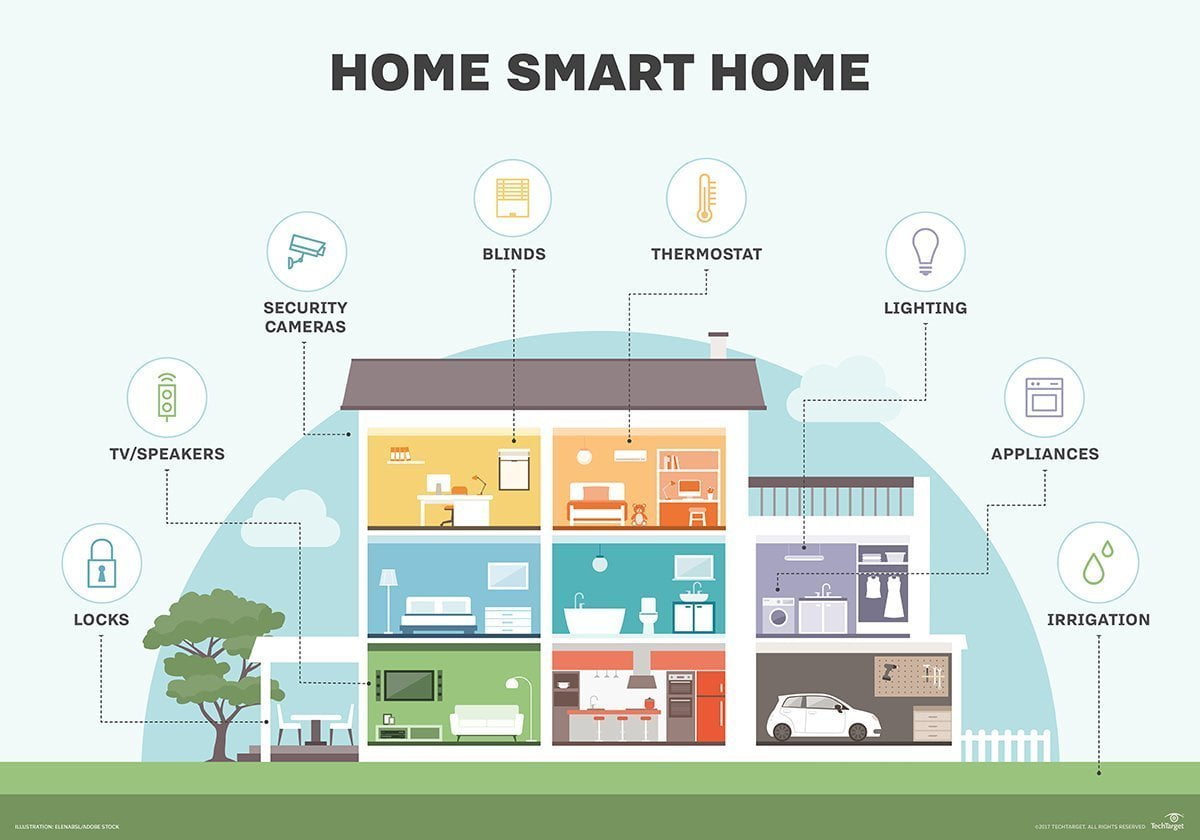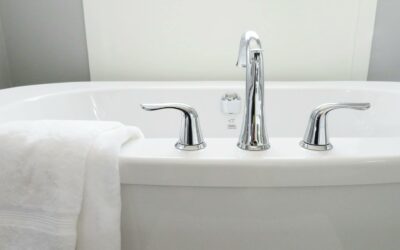The Environmental Impact of Home Automation… We need to think of Eco-digitisation
It’s not difficult to find evidence of automation in our daily lives – but what about our private lives, at home?
Home automation or domotics is essentially referring to what many may know as “smart homes”.
Now you may wonder how exactly a home could be smart. Well, smart homes include aspects concerning the lights, air conditioning and can entail functions like security and alarm systems.
Essentially, smart home appliances and setups enable the homeowner to be able to control the aforementioned devices remotely, usually as long as there is an internet connection.
Oftentimes, the different appliances may be interconnected which further simplifies the use and can make it all more practical.
But are smart homes aligned with the sustainability agenda?
The concept of smart homes has become increasingly popular due to its benefits such as more convenience, cost savings – and energy efficiency. But nobody – and nothing – is perfect, so where is the catch?
The Danger of Wireless Home Automation
One key issue that is already well known is security.
In the past, there have been incidents that endangered homeowners because of their use of smart home devices.
As with everything that is on the internet, there is a danger of being hacked and losing the exclusive control. When this occurs with a smart home, there may be the risk of being robbed or otherwise harmed as a result, especially when using wireless systems.
A Popular Development
On the other hand, home automation could also increase security, through measures like motion sensors which alert the homeowner in case of movements when the house should be empty.
And it is impossible to deny the large hold that the technology has taken on homeowners.
According to Investopedia, “in the U.S. smart home market, the number of active households is expected to amount to 77.0m users by 2025”.
All the above-mentioned devices that are connected to the internet are part of the internet of things (IoT) technology.
The internet of things refers to physical items which share a network connection and are able to exchange information in that way as well.
So How does This Topic Relate to Sustainability?
One major point is energy efficiency and savings that typically result from using smart thermometers and lighting systems.
Additionally, water can be saved through smart irrigation systems.
Naturally, these aspects go hand in hand with cost savings which are among the main advantages that consumers may see.
And while saving money, they may also “save” the planet, or at least contribute to its saving.
The Social Impact
On another note, the World Economic Forum found that “84% of IoT deployments are currently addressing, or have the potential to address, the Sustainable Development Goals (SDGs) as defined by the United Nations.”
If you are not familiar with the SDGs yet, it is high time that you get acquainted.
Briefly put, there are 17 goals which form the 2030 Agenda for Sustainable Development. This was adopted by all UN member states in 2015 and marks an important milestone in the route towards a sustainable, just and peaceful world.
You can find more information on the different goals and targets on the United Nations’ website here.
The link between the internet of things and the SDGs shows how even beyond the environmental impact, the technology has a potential to also greatly influence the social dimension in a positive way.
Sustainability Drawbacks
There is a large drawback, however, which relates to the source of energy used for data centers. These should be powered by renewable energy in order to make sure the sustainability impact of smart homes is not compromised in that way.
Another issue is the hardware of the appliances and systems, which can easily become obsolete within a rather short time span. In order to avoid this, users need to be aware of the depletion of resources that occurs because of the overconsumption.
A decision needs to be made before buying a new item, and that is: “Do I need another device for my house or can I make do with what I already have and by improving my habits? Would this investment truly improve the environmental footprint of my home? Is there a way to purchase this item second-hand?”
In this way, consumers can aim to make more mindful and sustainable decisions.
And of course, some issues may arise with smart houses -showcased by a humorous…
This month was all about the internet and its links to sustainability. So now we are curious to know…
- Which facts in our articles surprised you the most this month?
- Did you ever consider your digital carbon footprint?
- Do you already own any IoT technology? And if so, what is it?
- In your opinion – are smart homes the best way to make your home more sustainable and efficient?
- And did you already know the Sustainable Development Goals?
Sources
- Home automation – Wikipedia
- Smart Home Definition (investopedia.com)
- Sustainable with the Internet of Things | Deutsche Telekom
- The Internet of Things (IoT): An Overview (investopedia.com)
- What is smart home or building (automation or domotics)? (techtarget.com)
- THE 17 GOALS | Sustainable Development (un.org)






Truthfully, I never considered my digital carbon footprint much. But now I realized that I cannot just ignore this huge part of my life..
And actually I did know the SDGs, at my company we did a workshop connecting them to our business model!
Thanks for your comment! It’s great to hear that… Each of us are part of this deep change for the better!
Such an interesting technology, but not for me. I’d rather keep living rather in an analogue fashion, it seems easier than adapting to all this tech
There are many people who, like you, think that if the technology does not provide any real benefit, it is better to carry on as usual.
Oh please, dont be such a buzzkill. Who cares about alien invasions when we can have the convenience and efficiency of automated living? Its time to embrace progress and stop worrying about things that may never happen. #OptimisticTechLover
Comment: Who needs a smart toaster? Just give me a regular one and save the planet!
who knew home automation could be so controversial? I mean, come on, its just a fancy way to control your lights and appliances. But hey, if its gonna save the planet, count me in! #TeamAutomatedLiving
I never thought Id see the day when my toaster could cause an environmental crisis. 🤯
I never thought home automation could have such a huge environmental impact! #mindblown
Automated living sounds cool, but what about the impact on our mental health? #MindOverMachines
While automated living may offer convenience, its crucial to consider the toll it takes on our mental health. Constant reliance on machines could lead to a lack of human connection, isolation, and dependency. Remember, our minds matter more than any technological advancement. #PrioritizeMentalWellbeing
Actually, home automation can have a positive environmental impact. It allows for efficient energy use, reducing waste and carbon emissions. So dont be so quick to judge. 🌱🏠
Actually, home automation can be quite eco-friendly! With smart thermostats, lighting controls, and energy monitoring, its possible to reduce energy consumption and minimize environmental impact. Its all about using technology responsibly to create a more sustainable and efficient home.
Article: Automated Living: The Environmental Impact of Home Automation
Comment: I heard robots are taking over the world, but now even my toaster is a threat to the environment? 🤔
Comment: Oh please, dont be so dramatic! Its not about your toaster becoming the next eco-villain. Its about being mindful of our choices and finding a balance. Home automation can actually help us reduce energy consumption and live more sustainably. So calm down, toast your bread, and lets save the world together! 🌍
Sure, automating our homes may be convenient, but what about the lost personal touch?!
Who needs personal touch when we have smart homes? Automation saves time, energy, and gives us control at our fingertips. Embrace the future and let technology take care of the menial tasks, leaving us more time to focus on what truly matters.
Comment: Nah, robots taking over our homes and lives? Thats just science fiction nonsense. We control technology, not the other way around. Lets focus on the real issues instead of dwelling on far-fetched fantasies, shall we?
Comment:
Hey everyone, just read this article on automated living and I have to say its a fascinating topic! 🤖🏠 Who would have thought that our homes could be so high-tech? But, lets talk about the environmental impact… Is it really worth it? 🌍🤔 #SustainabilityDebate
Automated living is cool but lets not forget about the energy consumption and waste it creates. 🌍🔌
While automated living offers convenience, we must prioritize sustainability. Energy consumption and waste are valid concerns that demand attention. Lets find ways to strike a balance between technological advancements and environmental responsibility for the sake of our planet. 🌱🌎
Article: Automated Living: The Environmental Impact of Home Automation
Comment: I love the idea of living in a tech-savvy home, but what about the electricity bills? 💸
Comment: Electricity bills are a small price to pay for the convenience and efficiency of a tech-savvy home. Plus, with advancements in renewable energy, we can minimize the environmental impact. Embrace the future, my friend! 💡🌍
Automated living sounds cool, but what about the creepy factor? I dont want my house spying on me!
Automated Living sounds cool, but Im worried about the environmental impact. Thoughts?
I get your concern about the environmental impact of Automated Living. Its definitely something we need to consider. However, lets not dismiss the potential benefits it could bring, such as increased efficiency and convenience. Perhaps we can find a balance between technology and sustainability. What do you think?
Automated living sounds cool, but lets not forget the dangers of wireless home automation! #StaySafe
Oh please, dont be such a worrywart! Embrace the convenience and innovation that wireless home automation brings. Just take proper security measures and youll be fine. Dont let fear hold you back from enjoying the future. #EmbraceChange